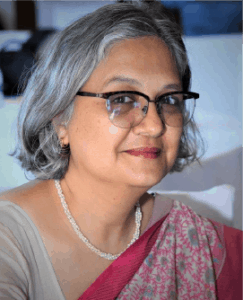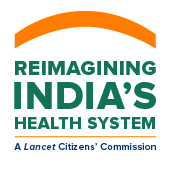In Conversation: Leila Varkey, Independent Public Health Researcher
May 04, 2022

I have worked within the fields of public health practice and research, evaluation and policy advocacy in India for over 30 years. My research work has remained within in the areas of primary data collection, qualitative research and public programs’ design and evaluation. Most of these initiatives aimed to improve women’s reproductive health and family planning. I contributed as a member of the HLEG for UHC for the Planning Commission.
My interest in health care and health systems grew out of a desire to understand women’s health care utilization and constraints. My research and advocacy work inform planners and policy makers about the issues faced by health care providers, especially nurses and other community health workforce. I believe that if the needs and desires of the health workforce ( Human Resources for Health) are adequately taken into consideration, health services and health systems work at their optimum. This complex system’s functioning rests of harmonious collaboration and respectful, valued and skilled teams. If undervalued or out of sync, the whole system suffers and citizens do not receive the health services they expect and are entitled to.
My role and research interests inform the cross section of the Human Resources for Health workstreams with the other workstreams. My own research interests and experience have spanned social and cultural issues and health care provisioning to meet maternal, newborn health and family planning.
My core expertise is the collection and use of primary research, my advocacy work experience helps me articulate the desired capacities and competencies of the HRH, which the Commission discusses researches and analyses to make recommendations on behalf of us all (as a Citizen’s commission). I work to ensure that our HRH workstream acknowledges and records the current workforce’s perspective and aspirations. I see my HRH reimagining role as doing justice to the aspirations of young people, especially young women, who see entry into the health care sector as a source of meaningful employment and stable careers. These expectations sit within the change and mind-shift the Commission develops. Our HRH workstreams’ recommendations balance the efforts that the overall Commission suggests, especially measures that would fill the expertise gaps while keeping the career goals and community’s expectations in focus.
The key challenge I see is in the implementation of the word “Universal” in letter and spirit. Combining the different structures and designs of health services provisioning, with the underlying economic and policy constraints, without too many conditionalities for the citizens access across India is, in my view, the most challenging part of reaching Universal health coverage in India.
Being a Citizens’ commission, as concerned experts who span a broad spectrum of expertise, the Commission is realistic in its goal. We will identify and provide evidence not usually captured in public or private sector convened committees or assignments. The structure of the Commission allows for the freedom to think out of the box and contribute to evidence generation and analysis.
The downside of this Commission’s mandate (different from the HLEG) is that, since neither the government nor the private sector asked for it or need take up any of the recommendations it may not have the desired impact.
However, I feel that we can address the Elephant(s) in the room (such as corruption, and unbridled profit/expansion, etc.). The Commission’s discussions suggest there is a desire for bringing together ideas that consider the best of diverse health care provisioning mechanisms – scale, efficiency and intent, quality and geographic access across India. The open access publications from the Commission will also provide reliable evidence on the health system’s situation and citizen’s thoughts in the post 2019 COVID era; that is multi-sectoral and points to gaps and ways to ensure no one is left without Healthcare.
